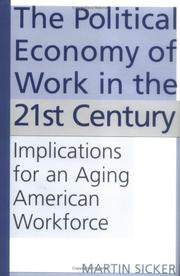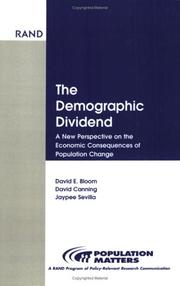| Listing 1 - 4 of 4 |
Sort by
|

ISBN: 1567205666 0313011788 9780313011788 9781567205664 9798400698026 Year: 2002 Publisher: Westport, Conn. Quorum Books
Abstract | Keywords | Export | Availability | Bookmark
 Loading...
Loading...Choose an application
- Reference Manager
- EndNote
- RefWorks (Direct export to RefWorks)
Older people --- Aging --- Age distribution (Demography) --- Personnes âgées --- Vieillissement --- Répartition par âge (Démographie) --- Government policy --- Economic aspects --- Politique gouvernementale --- Aspect économique --- POLITICAL SCIENCE --- Labor & Industrial Relations --- Gerontology --- Social Welfare & Social Work --- Social Sciences --- Personnes âgées --- Répartition par âge (Démographie) --- Aspect économique --- Age --- Ageing --- Senescence --- Distribution, Age (Demography) --- Physiological effect --- Developmental biology --- Longevity --- Age factors in disease --- Age groups --- Vital statistics --- Population aging

ISBN: 0833029266 9786612283116 1282283111 0833033735 9780833033734 9780833029263 Year: 2003 Publisher: Santa Monica, Calif. Rand
Abstract | Keywords | Export | Availability | Bookmark
 Loading...
Loading...Choose an application
- Reference Manager
- EndNote
- RefWorks (Direct export to RefWorks)
There is a long-standing debate on how population growth affects national economies. The authors, led by Harvard economist David Bloom, examine the history of this debate and synthesize current research on the topic. They conclude that population age structure, more than size or growth per se, affects economic development, and that reducing high fertility can create opportunities for economic growth if the right kinds of educational, health, and labor-market policies are in place.
Demographic transition --- Age distribution (Demography) --- Population --- Fertility, Human --- Economic development --- Transition démographique --- Répartition par âge (Démographie) --- Fécondité humaine --- Développement économique --- #SBIB:031.GIFT --- #SBIB:314H270 --- #SBIB:032.GIFT --- -Economic development --- Human population --- Human populations --- Population growth --- Populations, Human --- Economics --- Human ecology --- Sociology --- Demography --- Malthusianism --- Human fertility --- Natality --- Human reproduction --- Infertility --- Development, Economic --- Economic growth --- Growth, Economic --- Economic policy --- Statics and dynamics (Social sciences) --- Development economics --- Resource curse --- Transition, Demographic --- Vital revolution (Demography) --- Vital statistics --- Distribution, Age (Demography) --- Age --- Age groups --- Population aging --- Demografie en economische interrelaties: algemeen --- Age distribution (Demography). --- Demographic transition. --- Economic development. --- Fertility, Human. --- Population. --- Business & Economics --- Real Estate, Housing & Land Use --- Transition démographique --- Répartition par âge (Démographie) --- Fécondité humaine --- Développement économique

ISBN: 026204157X 026227177X 0585030960 9780262271776 9780585030968 9780262041577 Year: 1996 Publisher: Cambridge, Mass. MIT Press
Abstract | Keywords | Export | Availability | Bookmark
 Loading...
Loading...Choose an application
- Reference Manager
- EndNote
- RefWorks (Direct export to RefWorks)
The United States Social Security fund is huge and in trouble. The United Kingdom has experimented with the voluntary contracting out of pensions to the private sector. Chile has privatized its public pension system. Australia has adopted a means-tested public pension system. Japan has the earliest retirement age of any advanced economy; it also has the highest rate of labor force participation by elderly men. Can We Afford to Grow Older? provides a comprehensive, up-to-date survey of the implications of population aging in these and other OECD countries relative to a range of specific interrelated issues--Social Security schemes, employer pensions, educational attainment, wage growth and distribution, economic productivity, consumption, savings, retirement, and health care--all within a realistic framework for modeling and discussing policy. International in scope, filled with rich institutional detail, and built on a solid technical foundation, this will be a standard reference on the economic consequences of aging. Richard Disney adopts a "life-cycle" view of the world which recognizes that individuals often make plans with a forward-looking perspective across the stages of childhood, the peak of economic productivity, and retirement. He stresses the existence of overlapping generations and the reality of generational transactions (which include tax and transfer systems, bequests, and charity to the elderly). And he assumes intertemporal optimization as a useful unifying basis for analyzing social security, private pension schemes, lifetime labor-supply decisions, consumption, and saving. Among the surprising conclusions that emerge is that there is no "crisis of aging"--no adverse effect of aging on productivity. And although there are serious crises in pay-as-you-go social insurance programs and in health care, these have little to do with aging. Moreover, the shift in private provision plans away from traditional defined- benefit plans will continue, along with an interest in privatized pensions instead of social security.
Aging --- Older people --- Age distribution (Demography) --- Old age pensions. --- Vieillissement --- Personnes âgées --- Répartition par âge (Démographie) --- Pensions de vieillesse --- Economic aspects. --- Economic conditions --- Aspect économique --- Conditions économiques --- 351.84 --- 314 --- 316 --- #SBIB:316.8H40 --- #SBIB:316.8H14 --- #SBIB:HIVA --- AA / International- internationaal --- 339.320 --- 368.43 --- 332.832 --- 311.94 --- 332.622.1 --- -Aged --- -Age distribution (Demography) --- Old age pensions --- 305.26 --- Employees --- OASI (Old age and survivors insurance) --- Old age and survivors insurance --- Retirement pensions --- Survivors' benefits (Old age pensions) --- Pensions --- Distribution, Age (Demography) --- Age --- Age groups --- Vital statistics --- Population aging --- Aged --- Aging people --- Elderly people --- Old people --- Older adults --- Older persons --- Senior citizens --- Seniors (Older people) --- Persons --- Gerontocracy --- Gerontology --- Old age --- Ageing --- Senescence --- Developmental biology --- Longevity --- Age factors in disease --- Sociaal zekerheidsrecht. Sociaal bestuursrecht. R.S.Z.--(sociale verzekering zie {369}) --- Demografie. Bevolkingsleer --- Sociologie --(algemeen) --- Sociaal beleid: social policy, sociale zekerheid, verzorgingsstaat --- Welzijns- en sociale problemen: bejaarden --- Consumptie: algemeenheden. Wet van de vraag in verband met de consumptie. Consumptiebehoefte. Behoeftetheorie. --- Ouderdomsverzekering. Voorbarige dood. Weduwen en wezen. --- Pensioen. Brugpensioen. --- Verdeling van de bevolking naar leeftijd. Veroudering van de bevolking. --- Werkloosheid volgens leeftijd. Jeugdwerkloosheid. Werkloosheid van oudere werknemers. --- Economic aspects --- Physiological effect --- BUSINESS & ECONOMICS --- Personal Finance / Retirement Planning --- Social Welfare & Social Work --- Social Sciences --- Economic conditions. --- Age distribution (Demography). --- 316 Sociologie --(algemeen) --- 314 Demografie. Bevolkingsleer --- 351.84 Sociaal zekerheidsrecht. Sociaal bestuursrecht. R.S.Z.--(sociale verzekering zie {369}) --- Personnes âgées --- Répartition par âge (Démographie) --- Aspect économique --- Conditions économiques --- Verdeling van de bevolking naar leeftijd. Veroudering van de bevolking --- Werkloosheid volgens leeftijd. Jeugdwerkloosheid. Werkloosheid van oudere werknemers --- Pensioen. Brugpensioen --- Consumptie: algemeenheden. Wet van de vraag in verband met de consumptie. Consumptiebehoefte. Behoeftetheorie --- Ouderdomsverzekering. Voorbarige dood. Weduwen en wezen --- ECONOMICS/Public Economics

ISBN: 0521617243 052185153X 9780521617246 9780521851534 9780511510960 0511109946 9780511109942 0511109016 9780511109010 0511109636 9780511109638 0511510969 1280416319 9781280416316 9786610416318 6610416311 1107141311 0511171749 0511197543 0511302797 Year: 2005 Publisher: Cambridge : Cambridge University Press,
Abstract | Keywords | Export | Availability | Bookmark
 Loading...
Loading...Choose an application
- Reference Manager
- EndNote
- RefWorks (Direct export to RefWorks)
The world is getting older and no one knows exactly what life will be like in tomorrow's older societies. But we do know that age dependency ratios - the ratio of retirees to workers - will be much higher than we see today. The implications of this trend are plain. The combined effects of fewer workers, more retirees and longer retirement periods threaten not only the sustainability of pension systems but also the broader economic prospects of many developed countries. This book, first published in 2005, describes trends in birth rates, longevity and labor force participation and productivity, the cross-border flow of capital, the globalization of labor markets, the financial viability of social insurance programs, and the ways economic output is shared between working-age and retiree populations. Our most effective solution will likely be a multifaceted one: more workers, longer careers, higher productivity, and more global exchange and cooperation.
Life span, Productive. --- Pensions --- Age distribution (Demography) --- Retirement --- Older people --- Vie active --- Repartition par âge (Démographie) --- Retraite --- Personnes âgées --- Government policy. --- Economic aspects. --- Employment --- Politique gouvernementale --- Aspect économique --- Travail --- Labor supply. --- Bejaardenproblematiek 312-053.8 --- Bevolking 312 --- Pensioenen 658.325 --- Gezondheidszorg 61 --- Maatschappelijke ontwikkeling 304 --- OESO / OCDE / OECD 339.92OECD --- #SBIB:316.8H40 --- #SBIB:316.8H14 --- #SBIB:314H320 --- #SBIB:314H290 --- #SBIB:35H437 --- AA / International- internationaal --- 339.21 --- 368.43 --- 332.832 --- 311.94 --- Sociaal beleid: social policy, sociale zekerheid, verzorgingsstaat --- Welzijns- en sociale problemen: bejaarden --- Bevolkingsstudies: leeftijdsgroepen: ouderen: algemeen --- Demografisch beleid: algemeen --- Beleidssectoren: sociale zekerheid --- Ongelijkheid en herverdeling van vermogens en inkomens. Inkomensbeleid. --- Ouderdomsverzekering. Voorbarige dood. Weduwen en wezen. --- Pensioen. Brugpensioen. --- Verdeling van de bevolking naar leeftijd. Veroudering van de bevolking. --- Repartition par âge (Démographie) --- Personnes âgées --- Aspect économique --- Labor supply --- Life span, Productive --- Superannuation --- Termination of employment --- Leisure --- Old age --- Compensation --- Pension plans --- Retirement pensions --- Retirement income --- Annuities --- Social security individual investment accounts --- Vested benefits --- Productive life span --- Work life --- Working life --- Age and employment --- Life cycle, Human --- Post-retirement employment --- Labor force --- Labor force participation --- Labor pool --- Work force --- Workforce --- Labor market --- Human capital --- Labor mobility --- Manpower --- Manpower policy --- Distribution, Age (Demography) --- Age --- Age groups --- Vital statistics --- Population aging --- Economic aspects --- Government policy --- Verdeling van de bevolking naar leeftijd. Veroudering van de bevolking --- Pensioen. Brugpensioen --- Ongelijkheid en herverdeling van vermogens en inkomens. Inkomensbeleid --- Ouderdomsverzekering. Voorbarige dood. Weduwen en wezen --- Business, Economy and Management --- Economics --- RETRAITES --- DISTRIBUTION DES AGES --- PENSIONS --- OFFFRE DE TRAVAIL --- PERSONNES AGEES --- VIEILLISSEMENT DEMOGRAPHIQUE --- POLITIQUE GOUVERNEMENTALE --- ASPECTS ECONOMIQUES --- SITUATION ECONOMIQUE
| Listing 1 - 4 of 4 |
Sort by
|

 Search
Search Feedback
Feedback About UniCat
About UniCat  Help
Help News
News